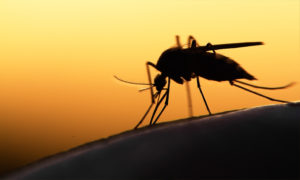 (Cherry Hill, NJ) – Early Monday morning the Mosquito Control Commission will be in the community spraying and surveilling areas throughout Camden County. During the summer and fall months the commission schedules on an as-needed basis based upon the results of their surveillance efforts and input from the public.
(Cherry Hill, NJ) – Early Monday morning the Mosquito Control Commission will be in the community spraying and surveilling areas throughout Camden County. During the summer and fall months the commission schedules on an as-needed basis based upon the results of their surveillance efforts and input from the public.
“The weekend is looking to stay mostly dry with a slight risk for a few intermittent afternoon showers on Saturday. We should still stay vigilant about checking our yards for standing water. Mosquitos need standing water to breed, so it important to routinely check your yard and remove any standing water to help eliminate the threat,” said Commissioner Jeff Nash, liaison to the Camden County Mosquito Commission. “This simple act can help reduce the pest population in your neighborhood and assist the efforts of the Camden County Mosquito Control Commission.”
The Camden County Mosquito Commission will be conducting ULV “spraying” operations on Monday, September 20 between the hours of 2am-6am in the following locations, weather permitting:
Somerdale
Orchard Ave.
Fenwick Ln.
Harford Rd.
Roberts Dr.
Harford Pl.
Roberts Ct.
Bee Ln.
Southwick Rd.
Southwick Circle
Chatham Rd.
Hinton Way
Eden Ln.
Bentley Ln.
Wessex Ln.
Bentley Ct.
Upton Way
Cotswold Rd.
Wyngate Rd.
Wyngate Pl.
Dorset Pl.
Dorset Ct.
McKinley Ave.
High St.
Wilson Ave.
Briarwood Dr.
Holly Ct.
Cherry Hill Township
Roosevelt Dr.
Ivy Ln.
Jade Ln.
Knoll Ln.
Lantern Ln.
Knollwood Ln.
Melody Ln.
Saddle Ln.
Surrey Rd.
Blue Bell Dr.
Coventry Ct.
Gately Ct.
Silvertop Ln.
Stratford Ct.
Wagon Ln.
Gloucester Township
Glen Burnie Dr.
Glen Burnie Ct.
Lexington Park Rd.
Aberdeen Dr.
Perryville Rd.
Easton Dr.
Piney Point Pl.
Oxford Ct.
Wye Mill Dr.
Kent Island Ave.
Crisfield Ct.
Crisfield Rd.
Annapolis Dr.
“The commission works with the Public Health Environmental Laboratories in Trenton to verify the presence of West Nile Virus and other communicable diseases in their samples,” Nash said. “If a pool tests positive, the Mosquito Commission returns to spray the area. The sprayings take place when the mosquitoes are most active.”
The mosquito spray is not harmful to humans or pets, but you should avoid direct contact if you have respiratory concerns or are sensitive to irritants.
Residents should check their property for any object that holds water for more than a few days. All pre-adult mosquito stages (eggs, larvae, and pupae) must be in stagnant water in order to develop into adult mosquitoes.
- Swimming pools are a common problem. All pools must be checked and maintained to keep them mosquito-free. Swimming pools can breed mosquitoes within days after you stop adding chlorine or other disinfectant. Pool covers can catch rainwater and become a mosquito development site. Add a little chlorine to kill mosquitoes.
- Maintain screens to prevent adult mosquitoes from entering your home or business.
- Personal protection is strongly urged if you are outside when mosquitoes may be active—generally dawn and dusk. Insect repellants containing between 10-35% DEET are very effective, however, be sure to follow the label directions and take extra precautions with children and infants.
The Camden County Mosquito Commission suggests checking around your yard for mosquito breeding containers. The following is a checklist of tips to help eliminate mosquito breeding:
- Dispose of unnecessary containers that hold water. Containers you wish to save turn upside down or put holes in the bottom so all water drains out.
- Lift up flowerpots and dump the water from the dish underneath every week.
- Stock fish or add mosquito larvicide to ornamental ponds.
- Change water in bird baths, fountains, and animal troughs weekly.
- Screen vents to septic and other water tanks.
- Store large boats so they drain and small boats upside down. If covered, keep the tarp tight so water does not pool on top of the tarp.
- Do not dump leaves or grass clippings into a catch basin or streams.
- Do not allow water to collect on sagging tarps or awnings.
- Do not allow trashcan lids to fill with water.
- Check downspouts that are able to hold enough water to allow mosquito larvae to mature.
For more information, or to report a problem, contact the Camden County Mosquito Commission at (856) 566-2945 or skeeters@camdencounty.com.
